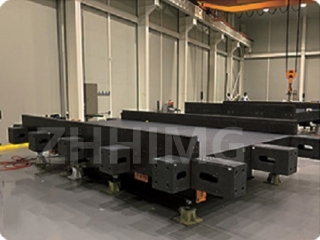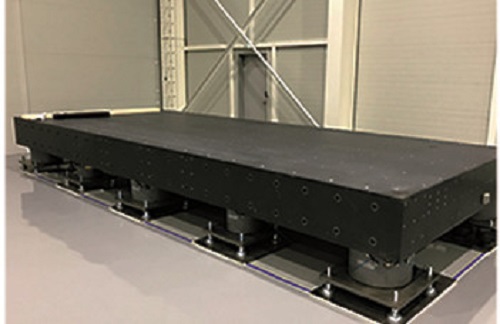In the lithium battery industry, as a core production equipment, the stability of the movement platform of the coating machine plays a decisive role in the production quality of lithium batteries. In recent years, many lithium battery manufacturing enterprises have found that when upgrading their equipment, after replacing the traditional cast iron base with a granite base, the stability of the moving platform has achieved a qualitative leap. According to actual tests, the stability improvement rate has reached as high as 200%. Next, we will delve into the reasons behind it.
The differences in material properties lay the foundation for stability
Thermal stability: Granite has significant advantages
During the operation of the lithium battery coating machine, factors such as motor running and heat generated by friction can cause fluctuations in the temperature around the equipment. The coefficient of thermal expansion of cast iron is approximately 12×10⁻⁶/℃, and its size changes significantly when the temperature varies. For instance, when the temperature rises by 10℃, a 1-meter-long cast iron base may elongate by 120μm. The coefficient of thermal expansion of granite is extremely low, only (4-8) ×10⁻⁶/℃. Under the same conditions, the elongation of a 1-meter-long granite base is only 40-80μm. The slight thermal deformation means that in a production environment with frequent temperature changes, the granite base can better maintain the initial accuracy of the moving platform and ensure the stability of the coating process.

Rigidity and damping performance: Granite is superior
Rigidity determines a material's ability to resist deformation, while damping performance is related to the efficiency of absorbing vibration energy. Although cast iron has a certain rigidity, it has a flaky graphite structure inside. Under the long-term action of alternating stress generated by equipment operation, it is prone to stress concentration, leading to deformation and affecting the stability of the platform. In contrast, granite is hard in texture, has a dense internal structure and excellent rigidity. Its unique mineral structure endows it with outstanding damping performance, enabling it to rapidly convert vibration energy into thermal energy for dissipation. Studies have shown that in a vibration environment of 100Hz, granite can effectively attenuate the vibration within 0.12 seconds, while cast iron requires 0.9 seconds. When the lithium battery coating machine is running at high speed, the granite base can significantly reduce the interference of vibration on the coating head, ensuring uniform and consistent coating thickness.
Quantitative data support for improved stability
Vibration test: The amplitude contrast is distinct
Professional institutions conducted vibration tests on the motion platforms of lithium battery coating machines equipped with cast iron bases and granite bases respectively. When the coating machine is operating normally and the speed is set at 100m/min, a high-precision vibration sensor is used to measure the amplitude of the key parts of the platform. The results show that the amplitude of the cast iron base moving platform is 20μm in the X-axis direction and 18μm in the Y-axis direction. After being replaced with a granite base, the amplitude of the X-axis decreased to 6μm and that of the Y-axis decreased to 5μm. From the amplitude data, it can be seen that the granite base has reduced the vibration amplitude of the moving platform in the two main directions by approximately 70%, significantly minimizing the impact of vibration on the coating accuracy and providing strong evidence for the improvement of stability.
Long-term accuracy maintenance: Slow error growth
During an 8-hour continuous coating operation test, the positioning accuracy of the platform was monitored in real time. When using the cast iron base, the positioning error of the platform gradually increases over time. After 8 hours, the cumulative positioning error of the XY axes reaches ±30μm. The positioning error of the motion platform with a granite base after 8 hours is only ±10μm. This indicates that during the long-term production process, the granite base can better maintain the accuracy of the platform, effectively avoid the coating position deviation caused by accuracy drift, and further confirm its stability advantage.
The stability of the actual production effect verification has been improved
On the actual production line of a certain lithium battery manufacturing enterprise, the cast iron bases of some coating machines were upgraded to granite bases. Before the upgrade, the defect rate of the product was as high as 15%, with the main defects including uneven coating thickness and coating deviation at the edge of the electrode sheet. After the upgrade, the defect rate of the products dropped significantly to 5%. After analysis, it is precisely because the granite base enhances the stability of the moving platform that the coating process becomes more precise and controllable, effectively reducing product defects caused by unstable platforms. This fully demonstrates the positive impact of the granite base on production quality in lithium battery coating machines.
In conclusion, whether it is from the theoretical analysis of material properties, the actual quantitative test data, or the effect feedback on the production line, it clearly shows that the stability improvement of the lithium battery coating machine's motion platform using a granite base compared to a cast iron base can reach 200%. For lithium battery manufacturing enterprises that pursue high quality and high capacity, the granite base is undoubtedly a key choice to enhance the performance of the coating machine.
Post time: May-19-2025

